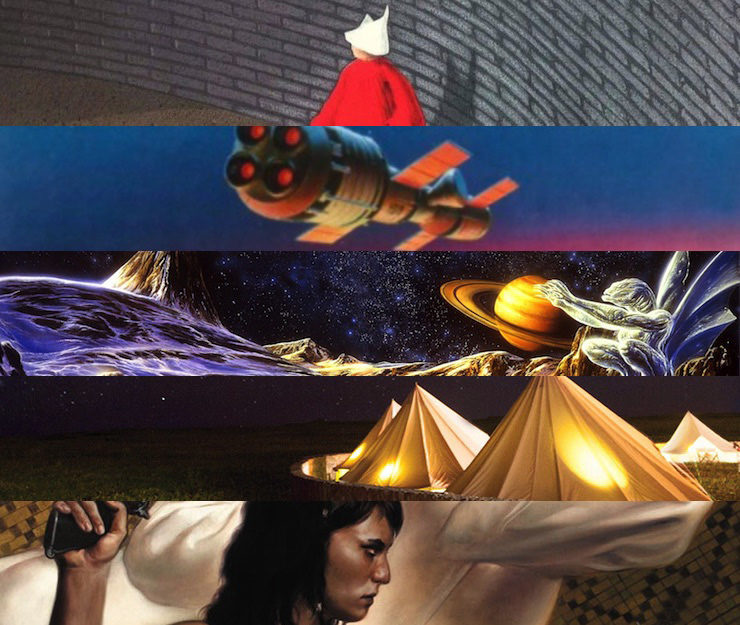The fiction featured in this year’s Clarke Award shortlist spans everything from the second American Civil War to a post-apocalyptic fable set in the ruins of a sub-genre. It’s a brilliant collection of novels that’s also indicative of the award’s past choices, too. For over three decades, the Clarke has focused on the frontiers of the genre and—especially if you look at each year’s shortlists as well as the winners—it’s basically an honour roll representing some of the absolute best SF published since 1987. I recently took a look at the complete lists, and would like to highlight just a few of my favorites…
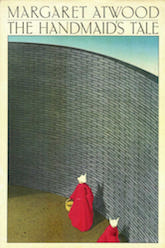 The Handmaid’s Tale occupies that rarified space where it’s both an essential text and one that is difficult to talk about without stepping into territory a lot of other people have already covered quite exhaustively. Margaret Atwood’s novel was the very first Clarke winner and explores life in Gilead, a brutal patriarchal dystopia in which women are viewed with a mixture of horror, pity, and fear.
The Handmaid’s Tale occupies that rarified space where it’s both an essential text and one that is difficult to talk about without stepping into territory a lot of other people have already covered quite exhaustively. Margaret Atwood’s novel was the very first Clarke winner and explores life in Gilead, a brutal patriarchal dystopia in which women are viewed with a mixture of horror, pity, and fear.
If you’re wondering what the difference between Gilead and 2018 is, Gilead doesn’t have Twitter.
Offred, the heroine, is a Handmaid assigned to a senior officer in Gilead command, who refuses to be broken by the horrific circumstances she finds herself in. She begins an illicit romance with a member of the house staff, discovers the truth about her world and, perhaps, gains an opportunity to fight back.
Atwood is, of course, one of the most consistently brilliant authors working today and this book remains one of her finest achievements. Waltzing along the razor’s edge between literary fiction and speculative fiction, The Handmaid’s Tale uses its own very existence as a text to provide one of the most potent moments of hope I’ve ever encountered in literature. There’s plenty of room for debate, however, even for those who wholeheartedly embrace the book’s overall themes; this piece at The Verge, for example, does an excellent job of exploring the way both novel and the current TV show deal with (or don’t deal with) race.
However valid those criticisms might be, the novel that has remained timely, horrifying, tragic, defiant, and essential since it was first published. The Handmaid’s Tale stands as a ringing endorsement of both the Clarke Award’s mission to celebrate the very best in SF and speculative fiction’s ability to engage deeply with the issues of the day. Nolites te bastardes carborundorum: not now, not ever.
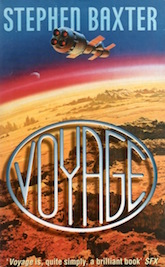 Skip ahead a decade to 1997 and Stephen Baxter’s Voyage is another of my favorite shortlisted titles, for very different reasons. Voyage was the first of Baxter’s NASA-centric novels and arguably still one of the best. It’s the story of a manned mission to Mars, unfolding from a divergent point of history which saw the Apollo program last a little longer and move forward in some different directions.
Skip ahead a decade to 1997 and Stephen Baxter’s Voyage is another of my favorite shortlisted titles, for very different reasons. Voyage was the first of Baxter’s NASA-centric novels and arguably still one of the best. It’s the story of a manned mission to Mars, unfolding from a divergent point of history which saw the Apollo program last a little longer and move forward in some different directions.
It works for me for three reasons. The first is that I am a real sucker for this kind of space travel fiction and cultural ephemera, and very few people do it better than Baxter. You get the exact sort of crunchy stuff the sub-genre demands: lots of rocketry, lots of historical context and a lot of bad outcomes based on good thinking.
The second is that it manages to do the thing that all alternate histories try and few succeed at: Voyage presents a warts-and-all version of its alternate present. There’s nothing idealised here; the realities of Operation Paperclip, the sacrifice through circumstance of the crew of a nuclear-powered Apollo capsule and many more all make it clear that the book is in love with this era of space travel, but not blind to its horrors and faults. That’s driven home even further by the fact that Baxter is all too aware of the symbolic damage the voyage does: Yes we’ve walked on Mars, but we’ve sacrificed so much to get there and, crucially, sacrificed knowledge. It’s a strikingly nuanced approach that stands as a polar opposite to the chummy blokeiness of The Martian. Voyage is cold, The Martian is adorable. The future for the sub-genre, I suspect, lies in the Lagrange point between the two.
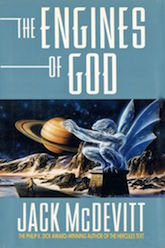 The same year, Jack McDevitt’s The Engines of God also made the shortlist. The first in what would become a multi-novel series, it follows pilot Priscilla ‘Hutch’ Hutchins, as she assists a team of xenoarchaeologists investigating the monuments left behind by a mysterious and long-dead alien race. Monuments which, they soon discover, hold far more data than they thought possible.
The same year, Jack McDevitt’s The Engines of God also made the shortlist. The first in what would become a multi-novel series, it follows pilot Priscilla ‘Hutch’ Hutchins, as she assists a team of xenoarchaeologists investigating the monuments left behind by a mysterious and long-dead alien race. Monuments which, they soon discover, hold far more data than they thought possible.
I love these books for the same reason I love The Handmaid’s Tale. They gleefully wind together three or four different genres at once; Science! Mystery! Action! Star Trek-style space archaeology, and stories about the clash between science and business! That’s especially true in The Engines of God where a central section of the book revolves around Hutch’s desperate attempts to buy her colleagues enough time to examine a potentially vital find on a world that’s about to be terraformed. This is nuanced, thematically heavy stuff, all wrapped up in the sort of two-fisted action adventure that pretty much anyone is going to find agreeable. In other words, just as with The Handmaid’s Tale and Voyage, there’s a lot of thematic exploration in McDevitt’s fictional world—however, here, it’s disguised as Tomb Raider in Space.
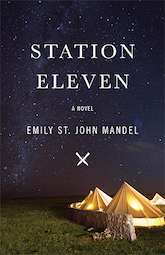 Station Eleven by Emily St. John Mandel won the prize in 2015 and it’s interesting to stop and note the spaces it shares with The Handmaid’s Tale. Both novels have taken flak for not being “real” science fiction, both feature a timeline that’s deliberately presented as slightly fuzzy, and both focus on the experience of women in extreme circumstances. What’s especially interesting, to me, is the different ways in which the two novels explore hope.
Station Eleven by Emily St. John Mandel won the prize in 2015 and it’s interesting to stop and note the spaces it shares with The Handmaid’s Tale. Both novels have taken flak for not being “real” science fiction, both feature a timeline that’s deliberately presented as slightly fuzzy, and both focus on the experience of women in extreme circumstances. What’s especially interesting, to me, is the different ways in which the two novels explore hope.
In The Handmaid’s Tale, hope is something that exists because Gilead, and the story of the novel, have boundaries. The final pages make it clear that Gilead fell while remaining definitively unclear as to what happened next. Station Eleven, for it’s part, explores the idea that we’re all fundamentally interconnected and that very connective tissue, especially in the form of culture, is what will outlive us. The story of both the moment when a globe-spanning plague broke out and of what’s left twenty years later, it’s a deliberately quiet, subdued novel to match the quiet Earth on which it’s set.
It’s only as the novel continues, and we see the two timelines expand, that it becomes clear just how closely connected the people we’re encountering truly are. That, somehow—even twenty years after an event that almost wiped out the entire species—humanity still remains this close, still remembering and embodying the past. And, crucially, humanity finds courage and peace not just in that embodiment, but in using it to create something new. That willingness to engage with old and new alike is as inspiring as it is touching and, for me at least, is a lesson genre fiction is decades overdue in learning. Station Eleven is a vital story in both senses of the word, told with intelligence, compassion, patience, and wit.
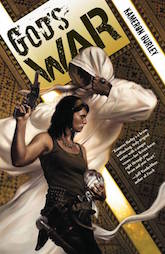 And last, but by no means least, God’s War by Kameron Hurley was shortlisted for the Clarke in 2014. Hurley, like Atwood, doesn’t know how to turn in bad work. Her books are shot through with savage humour, brutal violence, relentless pragmatism, and a cheerful willingness to do the thing the reader is least expecting. That’s true of everything I’ve read of Hurley’s, starting with her the first book of her Bel Dame Apocrypha trilogy, God’s War.
And last, but by no means least, God’s War by Kameron Hurley was shortlisted for the Clarke in 2014. Hurley, like Atwood, doesn’t know how to turn in bad work. Her books are shot through with savage humour, brutal violence, relentless pragmatism, and a cheerful willingness to do the thing the reader is least expecting. That’s true of everything I’ve read of Hurley’s, starting with her the first book of her Bel Dame Apocrypha trilogy, God’s War.
Nyx is a former Bel Dame, a government assassin on a world that’s locked into a centuries-old holy war. Nyx is very good at not dying. She’s arguably better at making other people die. She’s very bad at following orders—which makes her the perfect choice for a mission that’s as vital as it is terrifying and almost impossible.
Hurley drops you in at the deep end, here, and it’s glorious. Within the first fifty pages, you’ve been introduced to the world, the bug-powered technology that drives it, the negotiable nature of biology, and everything that you need to know about Nyx, her team, and her profoundly flexible morals. It’s intoxicating, overbearing, and refuses to let you go, so you dive further in. A few hundred pages later, the novel lets you resurface having explored the horrors of Nyx’s world, the people who she chooses (and the few who choose) to stand with her, and the terrible choices she’s continually forced to make. Sand-blasted, bloody-knuckled space noir, the Bel Dame Apocrypha novels are unlike anything else I’ve read and God’s War is just the beginning. The new Nyx collection, Apocalypse Nyx, will be out this summer, and there’s never been a better time to catch the former Bel Dame in action.
Female assassins, roaming troupes of Trek-obsessed Shakespearean actors, a quiet universe rendered suddenly loud, the horrors of Gilead, and the sacrifices of crewed space travel: the Clarke Award shortlists are a rollicking tour through some of the best western speculative fiction to date. This year’s list is no exception, and whoever wins the prize this July, the genre and all of its readers win, too.
Alasdair Stuart is a freelancer writer, RPG writer and podcaster. He owns Escape Artists, who publish the short fiction podcasts Escape Pod, Pseudopod, Podcastle, Cast of Wonders, and the magazine Mothership Zeta. He blogs enthusiastically about pop culture, cooking and exercise at Alasdairstuart.com, and tweets @AlasdairStuart.










